Ruth Moose
/fall 1973
TO BANBURY CROSS
“How could Daddy give her nightmares? Mares were horses. Horses to ride in the dark. Daddy used to ride her on his knee, sing, ‘Ride a cock horse to Banbury Cross to see a fine lady upon . . .’”
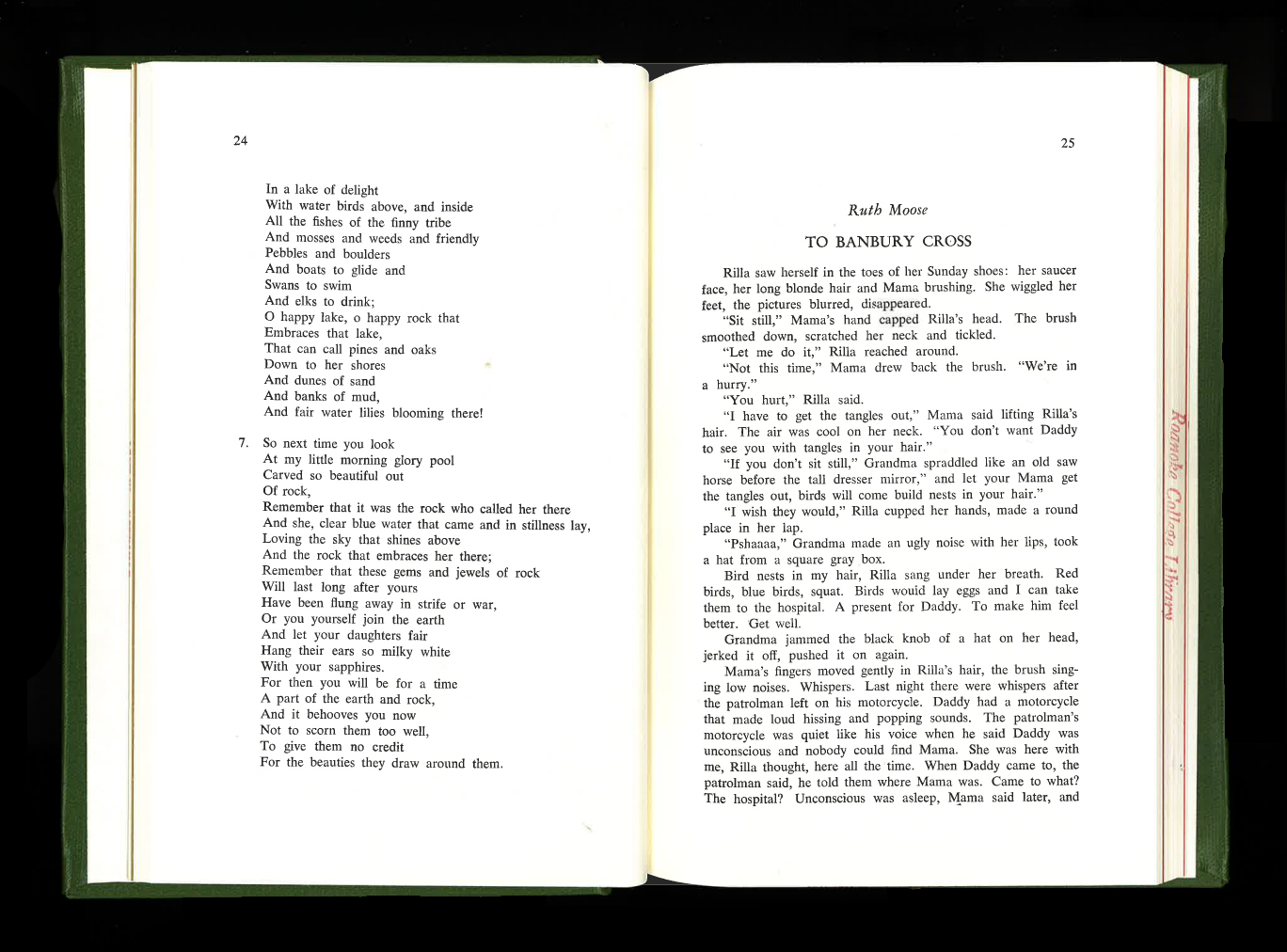
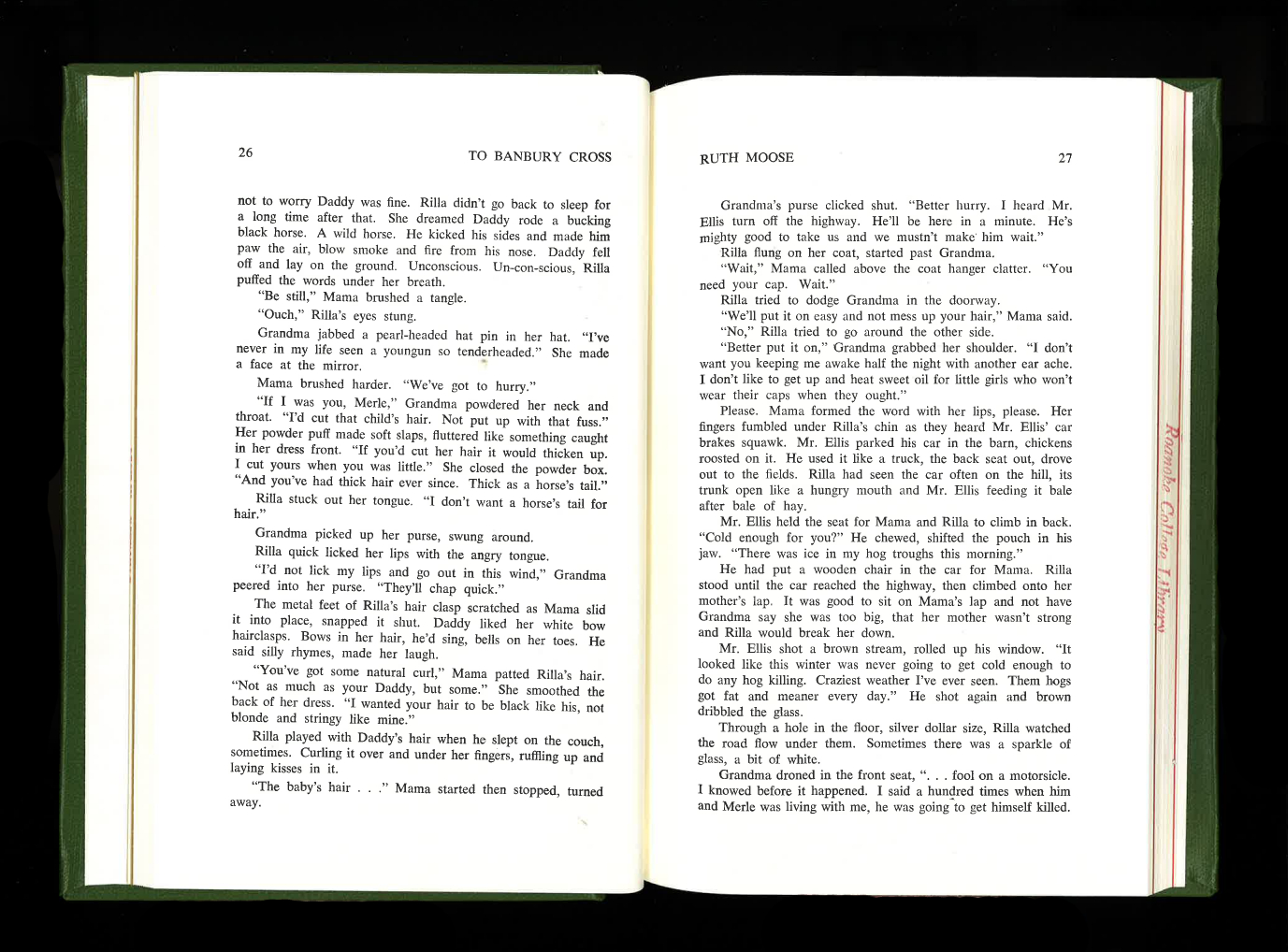
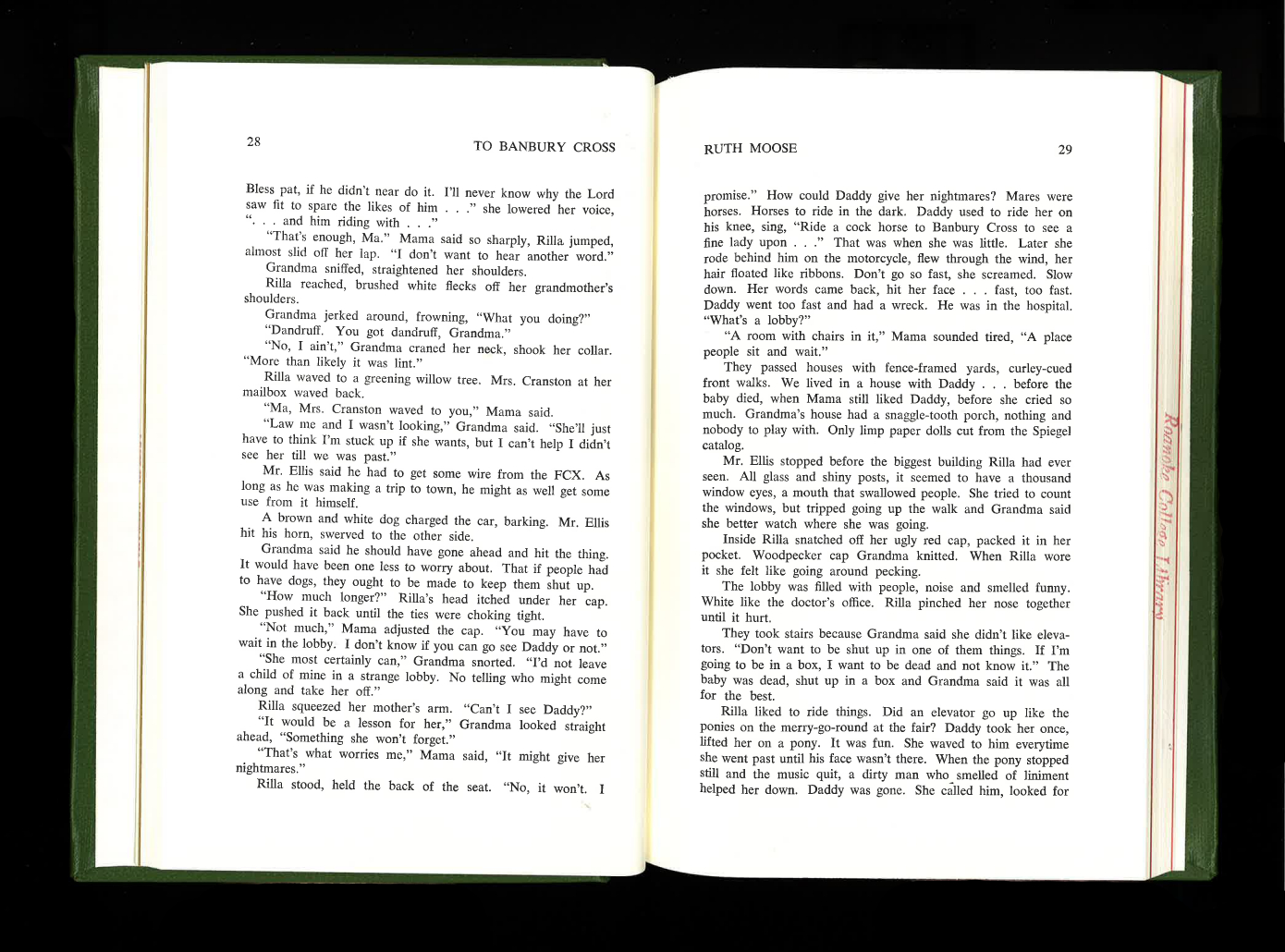
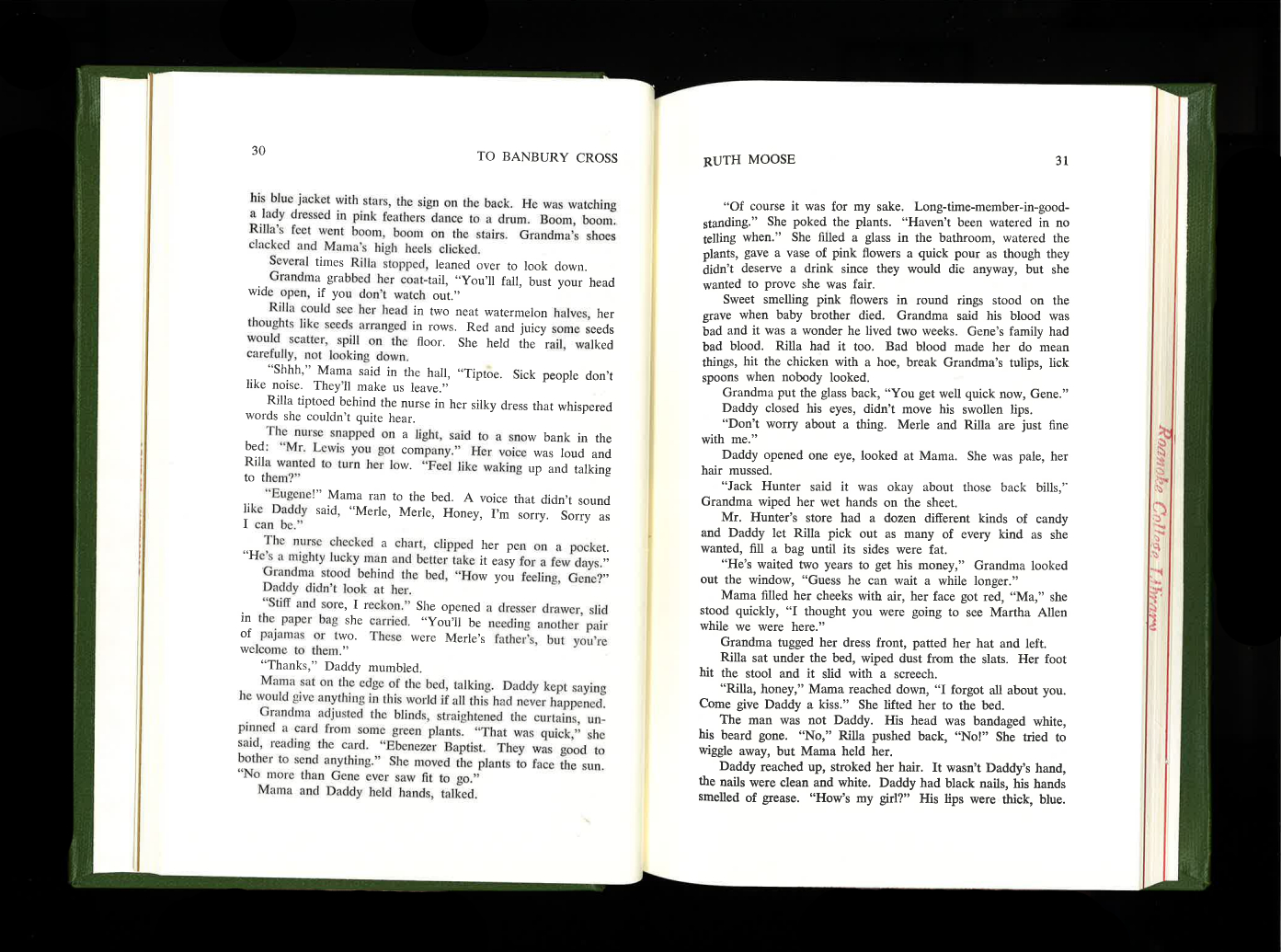
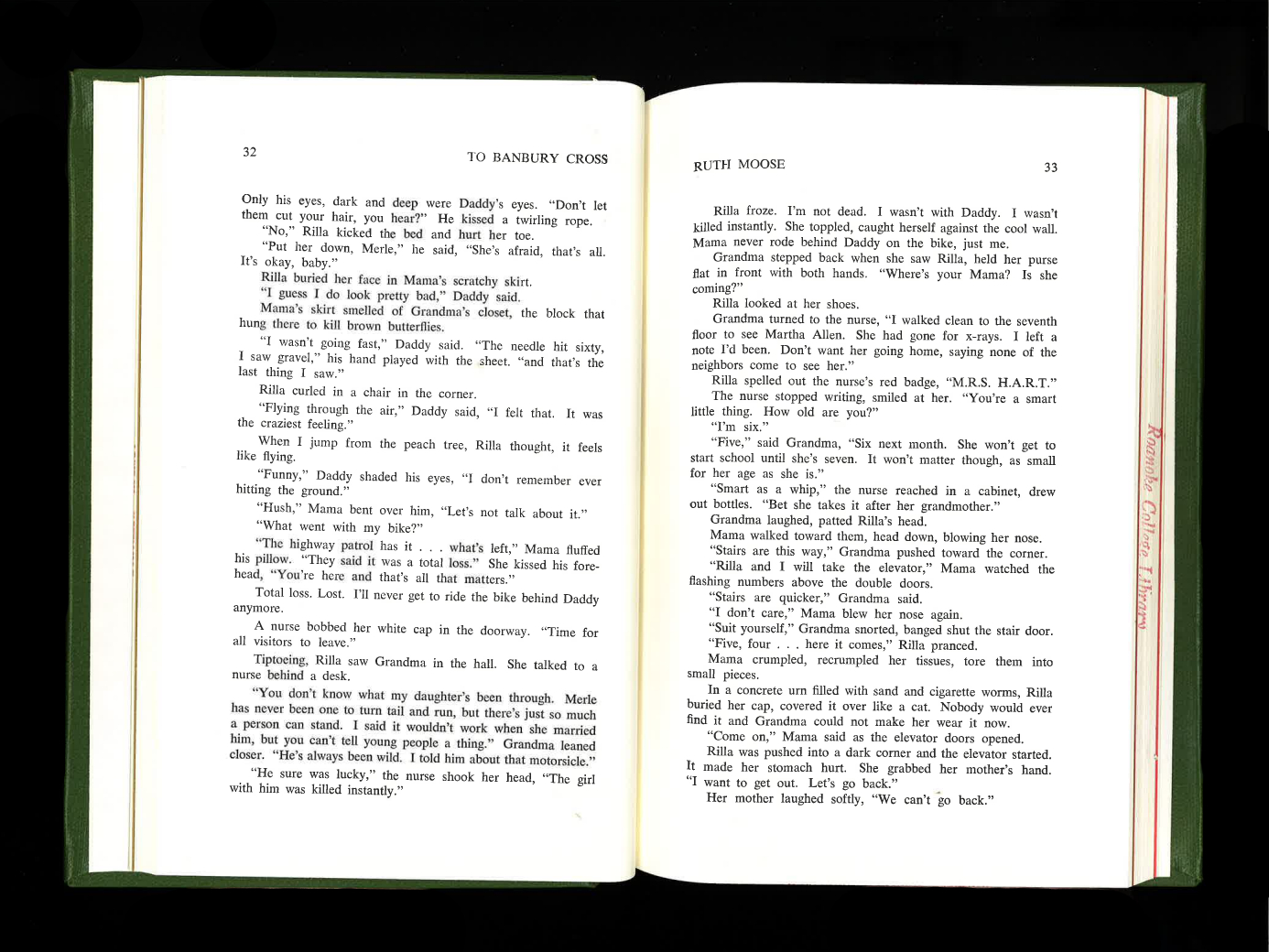
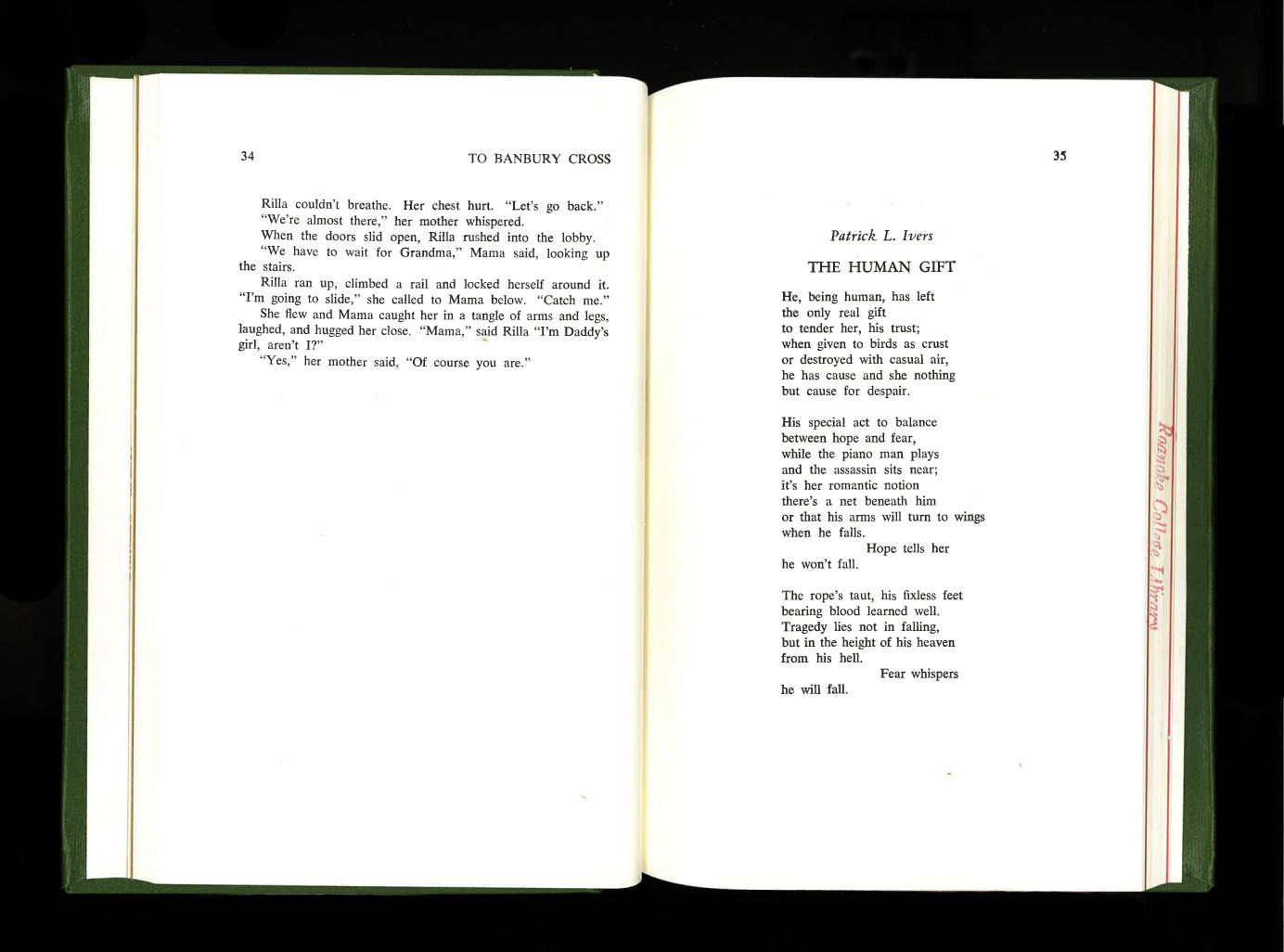
BY RUTH MOOSE - FROM ROANOKE REVIEW, FALL 1973
current work
MINT GREEN OVER CHOCOLATE SATIN
A city girl, “little miss prissy,” my teen uncles called me. “Sissy,” they teased. When my mother wasn’t around, they called me other things, made fun of the way I walked in the cow pasture, stepping around the cow custards. How I wouldn’t go in the barn because it smelled like the cow pasture. Now they were away at college or the army, all six of them. Only my aunt Lucille was still home on the farm with my grandmother and then just weekends. During the week she had a “good office” job in Charlotte and boarded with three roommates in a big white house on Central Avenue. She’d finished Mrs. Morgan’s Business School with skills in shorthand and typing, gone out into the world knowing she’d never have to do farm work; things like hog killing, picking cotton, washing clothes boiled in big black wash pots over an open fire; things my grandmother and a lot of her neighbors still did. At this time my grandmother’s farm, like most of her neighboring farms had outhouses. No one had an indoor toilet. (One of the first things “the boys” as my grandmother called them, did after they came home from the war, and they did come home, all of them, was to put in a bathroom. My grandmother’s pantry, which was just off the kitchen, turned out to be the perfect size. And while she enjoyed the convenience, for years she mourned the loss of her pantry.)
But for now, we had to go down the path, open the wooden door and climb up on a rough bench that had a hole cut in the middle. I thought it smelled like the barn, the cow pasture and I was terrified I’d fall in the black pit underneath that I was sure went straight down to hell. My aunt complained about having to go to the “john” on weekends. She announced often that the man she married would have to have a house with an indoor toilet or she wasn’t walking down the aisle.
My mother said her sister Lucille had big ideas. Fancy ideas.
I didn’t know why mother ever agreed to let me spend the weekend on the farm so Aunt Lucille could make my “formal.” My dress for the Seventh Grade dance, a big, big deal, something I had been looking forward to… until now.
When I heard about “the dress,” I moaned, groaned, begged my mother no, please not, anything but a “mint green net over chocolate satin dress.” My aunt had seen a picture in a magazine and bought the material in Charlotte on her lunch hour.
She wasn’t as good a seamstress as my mother and grandmother, but she planned to cut it out and my grandmother would do most of the sewing and fitting. They planned for me to take it home after the weekend and my mother would do the hem. She was better at finger work than either of them.
I was a captive. A prawn. It was either let my aunt make the dress or not go to the dance, the biggest event of the whole year, the culmination of spending seven years at West Albemarle School and this final year being “big dogs,” the seniors, the graduating class.
And I had a date. A new boy whose family had only recently moved to town. In Albemarle no one much moved into or moved away. We had births and deaths, otherwise things stayed pretty much the same year to year. In fact you knew from one grade to the next who your teacher would be. You heard horror stories, none of which turned out to be true.
The new boy’s name was Reece. An odd name in a class of Charles, John Michael, John David, George and Billys. Plus Reece had a cowlick, a dimple, dancing blue eyes and dressed better than the other boys: his jeans had creases even, and he wore shirts with collars, not tee shirts. I thought him cute, far above the other boys who sometimes smelled damp from wrestling in the grass or faintly like leather baseball gloves. His hands and nails were always pink, clean. All the girls liked him but one day he passed across the aisle to me, a folded sheet of notebook paper with blocks to check yes or no. “Do you like me?”
I checked yes. After that he held the water fountain knob for me to drink first, hung my coat on the coat rack beside his and smiled at me a lot.
A week before the dance, he passed across another note. This one asked if I’d go to the dance with him. Of course I checked yes, handed it back and he smiled, tucked the note in his shirt pocket. We were all set.
Except for the dress. My mother and aunt had conspired against me to be the worst dressed girl in the room. The worst prom dress in the world. Mint green over chocolate satin. Yuk. Whoever heard of such a thing?
My friends were to wear pink or yellow. Blue. Lavender. Ruffled organdy dresses they had worn for the May Pole celebration the school had just finished celebrating. In chocolate satin and mint green, I would stand out like the May Pole, odd, alone and in the middle a sea of pastels. Mother said mint green was a pastel. But that was only the skirt and with the chocolate satin top and underneath I imagined it might look like a bit of grass over a cow pie.
So here I was standing on a stool in the middle of my grandmother’s farm kitchen my Aunt Lucille sticking pins in me. Or that’s what it felt like as she draped dark brown fabric across my chest and back, pulled and pushed and tucked cloth into the elastic of my panties, said, “Turn around. Stand still. Stand up straight.”
I wanted to jump down and run as fast as I could up the dirt road and get a ride with the first car that came by…which would either be the mailman or Blaine Tucker whose family lived on the next farm over. I decided I would even ride on a tractor or combine if they came by first.
“Don’t fidget,” my aunt said with pins in her mouth. “It’s like trying to make a dress for a galloping horse.”
I felt something wet and warm in my panties and thought now I’d have an excuse to get down. “I have to go to the bathroom,” I said.
“Well make it quick,” my aunt said. “I want to get the bodice basted before it gets too dark to see.” She unpinned the fabric, me jiggling all the while, saying, “For god’s sake don’t pee on this dress. I’d never get the spot out.”
What I felt in my panties, didn’t feel like pee. It felt thick, soft and sticky between my legs. I thought I knew what it was, but I waited until I got to the outhouse to pull down my panties and see for sure.
Months before I’d had one period and when I saw the blood, thought I was going to die on the spot, my life pouring out of me in one red gush but my mother hugged me, said, “Honey, it’s what happens to ladies.” She handed me an elastic band with safety pins attached to it. She adjusted it to fit my hips, showed me how to pin on a thick white cotton filled pad.
I said I didn’t want to be a lady.
She laughed, “I don’t think you have much choice.”
I hated the wad of cotton between my legs. I felt as if everyone could see it buldge from my shorts. And the smell. A dried blood smell. I felt I reeked of it, though there was not a lot and over in a few days. I thought that was it forever though mama said it would happen every month.
“Phooey,” I said then forgot about it. Since it hadn’t happened for several months I thought I was over it and could now be normal again, be a boy.
I’d race my brothers in the yard, ride bicycles with them down the street, roll with them in the grass. I’d gotten used to the freedom of being a girl. Not a woman. I wanted to always be a girl, to run, jump, climb things, be one of the boys. Ladies were my mother and her friends who did housework “from morning till midnight” I’d heard them say, never get thanked, never get done though they did sometimes sit across the street on Mrs. Hatley’s front screened porch and do each other’s hair, tell each other things they’d never want their husbands to know, talk about their kids. I knew my mother had told them about my “period” because several days after it happened, they hugged me, smiled, shook their heads. It was as if overnight, in a single betrayal of my body, I had become a member of their club. A club to which I didn’t want to belong.
Now the thing I dreaded had happened again. Curses, curses I’d heard cartoon characters say, which my mother and her friends sometimes called “their monthly curse.” Here I stood in my white nylon slip in my grandmother’s outhouse, staring down at blood in my panties.
“Are you ok in there?” Aunt Lucille knocked on the door. “Need some help?”
“Can you bring me some clean underwear?” I said through the door.
“Stay where you are,” she said. “Don’t move.” She was back in a few minutes, during which I watched wasps flit and fly around a gray paper cone of a nest near the ceiling. I worried they’d come down and sting me, but they seemed more concerned with their nest and each other.
“Here you go,” she handed me the panties through a crack in the door, waited until I took off and handed her my stained ones.
A few minutes later she came back with a pinned, stretched piece of elastic and the same kind of thick cotton boat I had to wear between my legs. Curses, curses.
“I’ll rinse these out, let them soak in cold water,” she said and shut the door.
When I got back to the house, she was handing my grandmother pieces of the ugly “chocolate satin” to seam together. Neither of them looked at me but I knew she had told my grandmother who turned to me and said, “It’s about time. I’d wondered when.”
That was all that was said except in the middle of the night my aunt woke me, handed me a hot water bottle, said, “This helps ease the cramps.”
When she drove me home Sunday she had my dress finished except for the hem all folded in a neat packet on the back seat. She handed it to my mother who asked “How did it turn out?”
“Pretty good when you consider the fact you’re trying to fit it on a galloping horse,” she laughed.
Sometime, maybe after I’d gone to bed, my mother must have hemmed the god awful brown sack. She hung it on a hanger on the front of my closet door. That was the first thing I saw when I opened my eyes the next morning, I’d look like a burlap bag next to the rest of the girls at the dance. I could imagine Reese meeting me at the door to the hotel downtown where the dance was being held, (Patrica’s father was driving us), drawing up his face into a dark scowl and walking away, leaving me standing there even before I got to the dance floor. Especially when he took one look at my hair.
Mother had made me a beauty shop appointment. The day of the dance. My first perm. This had me yelling and screaming, no, I won’t go until she played her final card. “Wenifred’s feelings will be so hurt if you don’t come, let her do your hair for your dance.”
Wenifred’s name was revered among my mother and her friends. Her shop, Cut and Curl, on Love Street was a temple for them, a place they went weekly to worship. Wenifred could do no wrong. You never missed your appointment and you showed up on time or tongues wagged and tssked all around the neighborhood. You were outcast.
I went, mother’s hand under my elbow, pushed me in the Cut and Curl door, then abandoned me. I watched her walk away and wanted to run after her, beg her to let me escape this chamber of horrors where women sat under shinny bullets of helments or under black capes in chairs that swiveled in front of a row of mirrors. How anyone could bear to look at themselves in such states of disarray was more than I could imagine.
And the smell. Outhouse again. Pee and cow patties all wrapped up in one. My nose stung. The next thing I knew Wenifred grabbed me, smothered me under an evil black cape, started scrubbing my hair, then pulling and rolling it with a thousand metal rods, shoved me under one of those cone headed dryer and left me cooking under there. When I felt thoroughly roasted and broiled and my hair smelled burnt, she yanked me out and started unwinding my hair from those warm rods. My head felt hot all over.
She brushed my hair with both hands, then finally turned my chair around and there in the mirror I saw a freak. A bushy headed native from some wild country.
I cried all the way home.
Mother said it was beautiful and Wenifred had outdone herself. Then she showed me what the florist had just delivered in a cellophane box tied with a big pink bow on top. “Look,” she lifted out six baby roses backed with lacy fern. “Your first corsage.”
I could only try to hold my hair down, keep it from sticking straight out from my ears.
“You need to take a nap,” she said, “So you’ll be rested for your big night.” She pulled off my dress, patted the pillow and I lay down, closed my eyes, eyes still swollen from crying and the heat of that drier. My eyelids felt baked.
I slept until I woke with a jerk, had the feeling there were other people in the room, people standing around my bed, people looking at me.
I opened my eyes and screamed. My brother bent so close to my face I could smell his graham cracker breath. He laughed. All around my bed stood his friends, staring down at me. I screamed, then yelled, “You get out of here. Right now.”
They left, but not before I pulled up the spread and wrapped myself in it. Awful, awful. First that ugly dress, then my hair, now my brother and his friends seeing me almost naked.
Somehow I was thrust into that brown sack of a dress, then mother tied around my waist the green, mint green she kept saying, net over skirt. “Beautiful,” she had me turn around. Then she pinned the pink roses to my left shoulder. “You always wear a corsage with flowers at the top, the way they grow.” How did she know so much? And how much of it meant anything?
Patty’s daddy honked in front of the house and I trudged to the car, two already in the backseat, Patty in front. I squeezed in, my net crushed flat on each side the way I wished my hair could be. Nobody said much. Was everybody else as miserable as I was?
Marceline had on lipstick and rouge. Ellen wore gloves. I was the only one with a corsage. “Oh,” they ohed and ahed over it. I said, “Reece sent it.” They ohed and ahed some more. “Lucky girl.” I didn’t feel a bit lucky. I felt wavy in my stomach, worried I’d throw up in the backseat of Patty’s daddy’s car. And all over my friends.
At the hotel, we spilled out and Mr. Jinson drove off. We almost pushed each other to the double glass doors where Miss Ellis, our teacher and torturer waited.
Reece stood behind her, stepped forward when he saw me, grinned, reached out his hand. He led me to the dance floor where the rest of the class bobbed and swayed to piano music.
His hand was damp and I smelled some sort of lotion or wax he’d used to plaster down his cow lick.
We waltzed. We had cake and punch. We waltzed some more.
I decided I liked his arm around me, my arm around him, the way his warm hand held my cold hand, lightly, as though every bit of me was frail as the thinnest glass, that I was light as laughter, as valuable, as breakable as all those thin glasses in the bridal department of Belks, the blown glass globes on every Christmas tree in the world. I saw myself in his eyes and saw I was absolutely beautiful, the most elegant, outstanding girl in the room.
I danced as if I had feathers on my feet, but most of all, I couldn’t wait to tell my mother, to forgive her, to hug her and cry that it was all right for sending me out to embrace the world, and somehow, slowly, to accept and embrace myself.
a note from the author
I have always preferred working in the third person omniscient point of view but, as I’ve gotten older, found myself writing in first person more and more. Hence this “coming of age” piece. It was written in one day-long session at the computer, AFTER first being written in long hand. Some stories come whole! But not often.
Ruth Moose is the 2013 winner of the Malice Domestic Best First Traditional Mystery Novel Competition. She won the PEN Award for Syndicated Fiction, the Robert Ruark Award for the Short Story, and the Sam Ragan Fine Arts Award. She has received three Pushcart nominations and a National Endowment of the Arts Fellowship. She's published three collections of short stories and six collections of poetry. Having served in the Creative Writing faculty at the University of North Carolina at Chapel Hill for fifteen years, Moose received the Chapman Award for teaching. She lives in Pittsboro, North Carolina.

